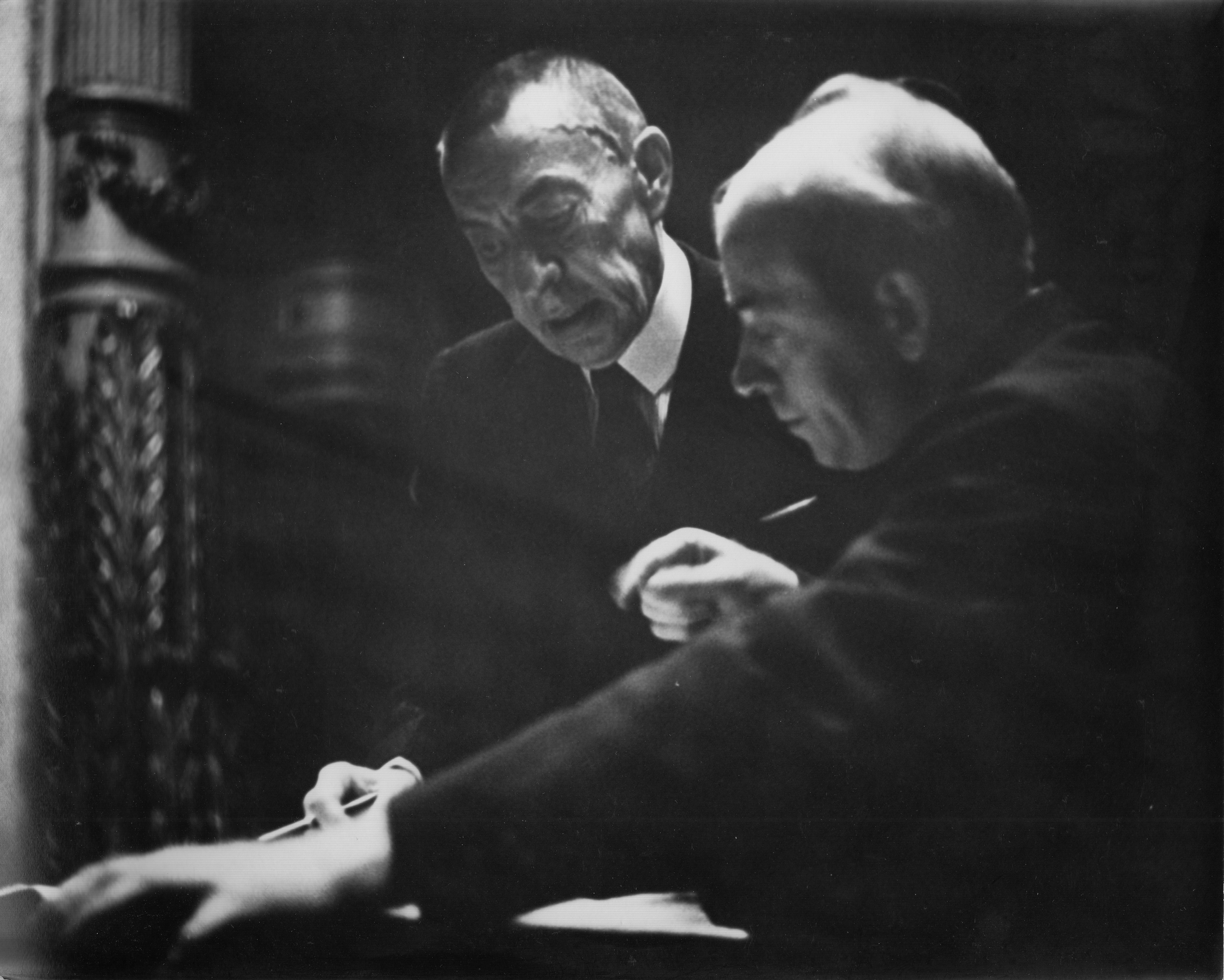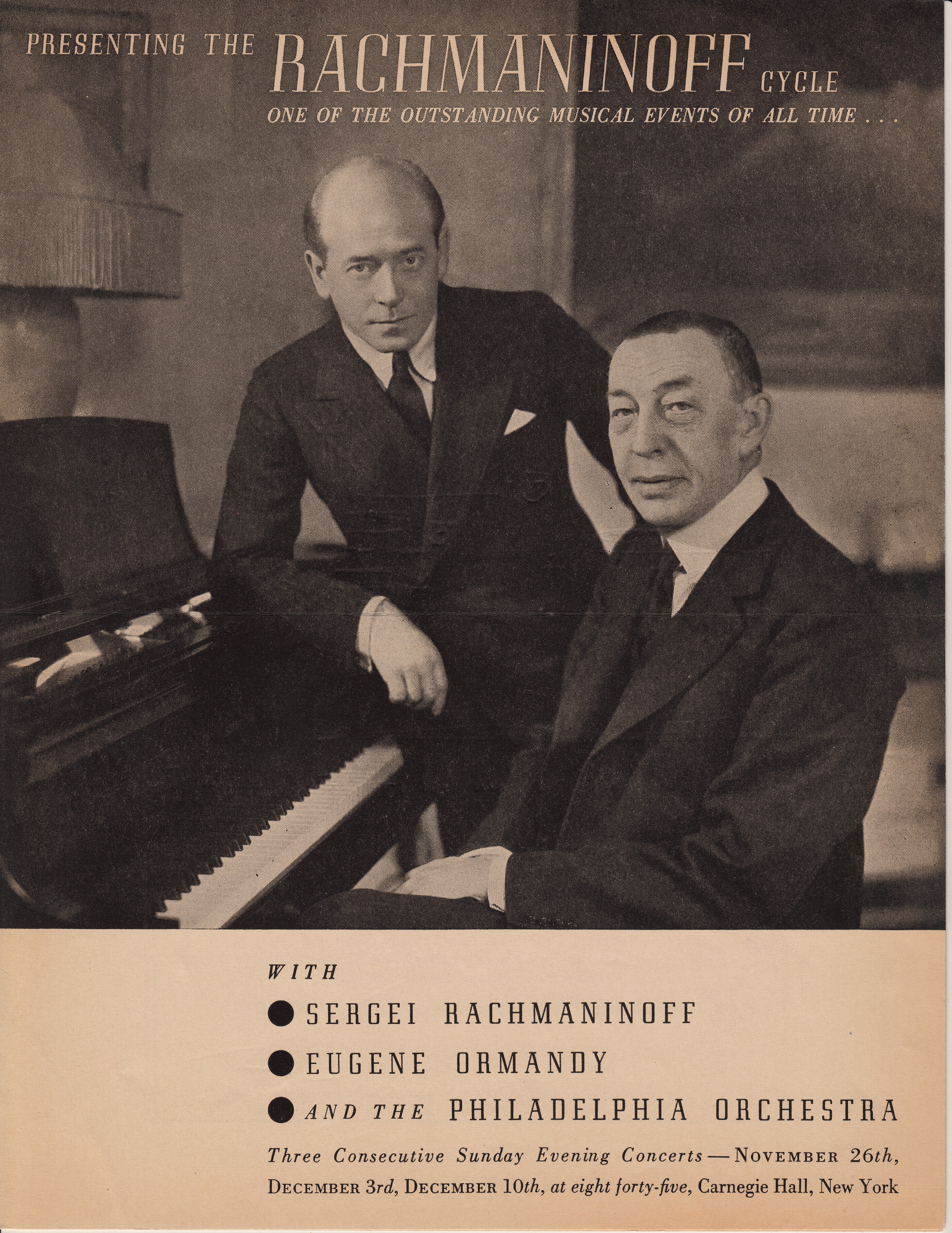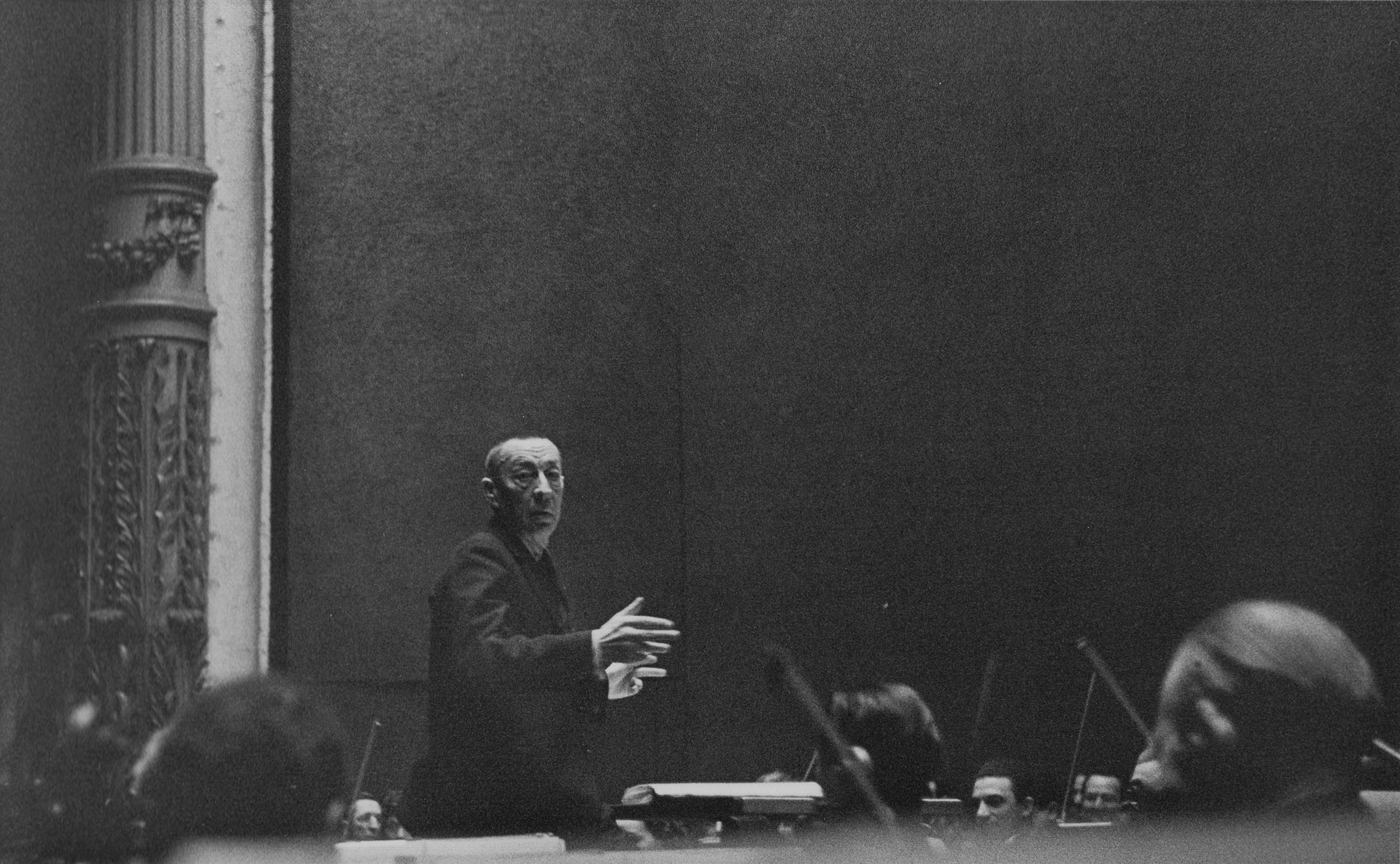Sergei Rachmaninoff, whose 150th anniversary is being celebrated internationally this season, enjoyed a unique relationship with The Philadelphia Orchestra that proved central to his magnificent artistic achievements as a composer, pianist, and conductor. After Rachmaninoff left Russia in the wake of the 1917 Revolution, he spent most of his remaining 25 years in America. He composed just six more major works, five of them with orchestra: the Piano Concerto No. 4, Three Russian Songs, Rhapsody on a Theme of Paganini, Symphony No. 3, and Symphonic Dances. All were written for, and premiered by, the Philadelphians. As pianist he recorded his four piano concertos and the Rhapsody, and as conductor he recorded three of his orchestral compositions, all with the Orchestra. The story of this long and remarkable partnership is one of the most significant in the ensemble’s distinguished history.

Sergei Rachmaninoff and Eugene Ormandy during a rehearsal. Photo: Adrian Siegel Collection/Philadelphia Orchestra Archives
The Philadelphians did more than just perform and record his music. Rachmaninoff consistently affirmed that the Orchestra represented his sonic ideal, what he heard in his inner ear. Music Director Eugene Ormandy recalled him speaking at the final rehearsal of his last composition, the Symphonic Dances. He told the ensemble that early in his career he had idolized his friend Feodor Chaliapin, the great Russian bass: “He was my ideal, and when I thought of composition I thought of song and of Chaliapin. Now he is gone. Today, when I think of composing, my thoughts turn to you, the greatest orchestra in the world.”
Rachmaninoff repeatedly gave such praise, as in a 1931 interview with Gramophone magazine: “To make records with the Philadelphia Symphony Orchestra is as thrilling an experience as any artist could desire. Unquestionably, they are the finest orchestral combination in the world. … Only by working with the Philadelphians both as soloist and conductor, as has been my privilege, can one fully realize and appreciate their perfection.” Clearly Rachmaninoff was willing to risk alienating other eminent orchestras and famous conductors—here referring to the New York Philharmonic and Arturo Toscanini—by offering such testimonials.
The fruitful bond began in 1909 during Rachmaninoff’s first trip to America, when he conducted a program consisting of Modest Musorgsky’s A Night on Bald Mountain and his own Second Symphony, and played three of his solo piano preludes. Nearly a decade later he returned to this country, now an exile. He needed to rebuild his financial fortunes to support his wife and two young daughters and thus undertook a grueling schedule touring America and Europe as a recitalist and concerto soloist.
Now age 45, his international renown had thus far been split among profiles as composer, pianist, and conductor. The last one pretty much disappeared despite being offered the directorship of the Boston and Cincinnati symphonies. He conducted just five more public concerts in his life, three with The Philadelphia Orchestra and two with the Chicago Symphony Orchestra. His enormous gifts as a conductor are solely documented in the Philadelphia recordings he made of The Isle of the Dead, Vocalise, and the Third Symphony.
After moving to America Rachmaninoff renewed the Philadelphia relationship in March 1919 when he played the revised version of his First Piano Concerto with Leopold Stokowski. In March 1927 Stokowski conducted the double world premiere of the Fourth Piano Concerto and the Three Russian Songs. They gave their third Rachmaninoff premiere with the Rhapsody on a Theme of Paganini in November 1934 and two years later unveiled the Third Symphony.

The cover of a brochure about the 1939 Rachmaninoff Cycle at Carnegie Hall. Photo: Philadelphia Orchestra Archives
That moment marked a juncture in the Orchestra’s history as Stokowski’s long music directorship gradually transitioned to the young Eugene Ormandy, who was thrilled to continue the Rachmaninoff partnership. This reached its height in late 1939 when the Orchestra mounted a “Rachmaninoff Festival” to mark the 30th anniversary of his debut. Three concerts at New York’s Carnegie Hall and five in Philadelphia’s Academy of Music featured the 66-year-old Rachmaninoff as concerto soloist and as the conductor of the final program, consisting of the Third Symphony and The Bells, a choral symphony.
The Festival was breathlessly billed as “one of the outstanding musical events of all time,” publicity hype to be sure, but nonetheless revealing of the composer’s eminent stature. The occasion allowed Rachmaninoff to dispel rumors that he would soon retire and gave him the chance to present the compositions he wanted and how he wanted. Rachmaninoff wrote to a friend: “This Festival seems to be, for some reason, a ‘totaling of the sum’”; it was widely recognized as the culmination of his career as composer and performer.
Its success led to Rachmaninoff’s fifth Philadelphia world premiere: the Symphonic Dances, presented in January 1941 with Ormandy. Rachmaninoff made six more concerto appearances and recorded the Fourth Concerto before a final concert playing the Second Concerto in Ann Arbor, Michigan, in May 1942. He died less than a year later, age 69, prompting Ormandy to dispatch a telegram to his widow: “Members of the Philadelphia Orchestra and I wish to extend to you and your family our deepest sympathy in your great loss. The world has lost one of the greatest musicians in the history of music making and our orchestra one of its greatest and most sincere friends.”
The use of the word sincere here particularly resonates with Rachmaninoff, who admired the quality in other composers. And it is a word, quite unfashionable among Modernist figures of the time, that helps to explain his great continuing appeal. Critics often complained that Rachmaninoff’s musical language was old-fashioned and derivative, especially of Tchaikovsky. For Rachmaninoff, however, the comparison was a compliment as he proudly sought to uphold the Russian musical tradition and valued more connecting with listeners than innovating for the history books. Both as a composer and performer, Rachmaninoff respected his audiences. There is never any indication of him selling out. He strategized, to be sure, as most musicians do (just read Mozart’s letters), but not cynically, and often with a good bit of humor.

Rachmaninoff conducting the Orchestra in a rehearsal in 1939. Photo: Adrian Siegel Collection/Philadelphia Orchestra Archives
Even as some critics grumbled about his conservative style, by the end of his life Rachmaninoff could enjoy wide vindication as a late great Romantic composer writing music that to this day remains a vibrant part of the active concert repertory. He became the most successful living composer if measured in terms of the quantity of performances, audience adoration, and financial rewards. Even Virgil Thomson, a repeatedly hostile critic over the years, wrote of him in the New York Herald Tribune: “Success was his in a way that musicians seldom experience it. It came to him in his own lifetime, moreover, and through the practice of three separate musical branches. As a composer, as a conductor, and as a touring virtuoso of the pianoforte he received world-wide acceptance and acclaim.”
For the final quarter century of his life, The Philadelphia Orchestra was crucial to Rachmaninoff’s life as a composer and performer. Stokowski, Ormandy, the Orchestra and its administration, and the enthusiastic Philadelphia audiences provided the mutually beneficial opportunities for him to compose, perform, and record. It is a glorious legacy about which Philadelphia can be very proud.
RACHMANINOFF 150
Jan. 26 & Feb. 4, 2023—Verizon Hall
Yannick Nézet-Séguin Conductor
Yuja Wang Piano
Rachmaninoff Piano Concertos Nos. 1 & 2
Rachmaninoff Rhapsody on a Theme of Paganini
Jan. 27 & Feb. 5, 2023—Verizon Hall
Yannick Nézet-Séguin Conductor
Yuja Wang Piano
Rachmaninoff Piano Concertos Nos. 3 & 4
Rachmaninoff Rhapsody on a Theme of Paganini
Jan. 28, 2023—Carnegie Hall
Yannick Nézet-Séguin Conductor
Yuja Wang Piano
Rachmaninoff Piano Concertos Nos. 1, 2, 3, & 4
Rachmaninoff Rhapsody on a Theme of Paganini
Christopher H. Gibbs, James H. Ottaway Jr. Professor of Music at Bard College, has been the program annotator for The Philadelphia Orchestra for the past 22 seasons.